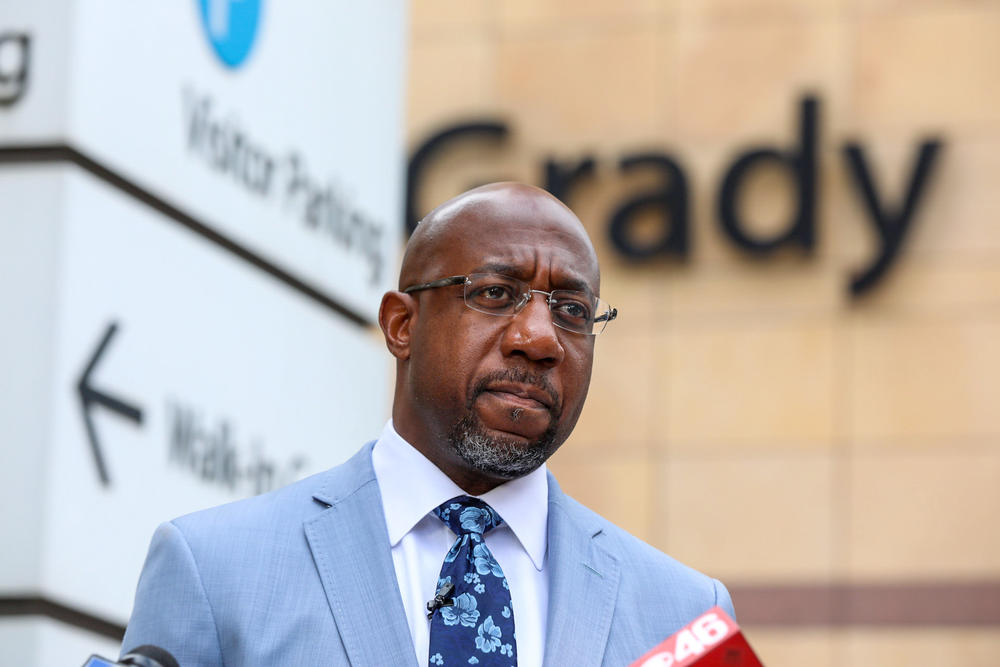
Caption
Candidates for Congress in Georgia are raising serious campaign cash, led by Sen. Raphael Warnock.
Credit: Riley Bunch

Candidates for Congress in Georgia are raising serious campaign cash, led by Sen. Raphael Warnock.
If you need more evidence that Georgia is a battleground state, look no further than the bank accounts of its candidates.
A GPB News analysis of campaign finance reports after the third quarter reporting deadline finds candidates in Georgia's 14 House seats and one U.S. Senate seat are sitting on more than $42 million in campaign cash heading into the final months of 2021. The 44 candidates that have raised more than $5,000 this cycle have collectively brought in more than $56 million — or enough to fund the city of Atlanta's general budget for about a month.
With control of both chambers of Congress on the line, Republicans and Democrats are stocking up on contributions in competitive races such as the U.S. Senate seat currently held by Democrat Raphael Warnock, who has a staggering $17 million cash on hand after raking in more than $9.5 million over the last three months.
After winning the special election runoff in January, Warnock has reported receiving more than $21 million towards his reelection from mid-February to Sept. 30, accounting for nearly 38 cents of every dollar given to a Georgia congressional candidate.
Trump-endorsed football star Herschel Walker blitzed onto the scene with nearly $3.8 million raised in a five-week span, split almost evenly between bigger itemized donations and small-dollar cash from across the country. Of the $1.88 million in itemized contributions, about 43% comes from Georgia, with donors in Texas and Florida also giving more than $100,000.
The other three Republican candidates in the race, Latham Saddler, Gary Black and Kelvin King, all saw their third-quarter numbers drop after Walker's entry into the race, and King spent more than he brought in during that span.
Georgia's wide-open 10th Congressional District race to replace Rep. Jody Hice is fueled by a heavy percentage of self-loans, with more than 40% of the $3.1 million reported coming from eight of the 10 candidates' own pockets.
In Atlanta's northern suburbs, incumbent Democrats Carolyn Bourdeaux and Lucy McBath each have close to $2 million cash on hand as the fate of their district boundaries will be determined in the special redistricting session starting next month.
A draft map released by Senate Republican leadership has Bourdeaux's 7th District drawn into a safe Democratic seat while McBath's 6th District would lean Republican. Still, McBath outraised her top three GOP challengers Jake Evans, Meagan Hanson and Harold Earls last quarter, excluding the $500,000 loan Evans made to his campaign.
The nationalization of Georgia politics is further evidenced by the large amount of cash funneling into the 14th District in northwestern Georgia, currently represented by Rep. Marjorie Taylor Greene. Greene's fundraising totals have declined every quarter since she took office in January and was removed of her committee assignments, but the controversial conservative has still outraised every candidate except Warnock.
Greene has over $3 million in the bank after receiving $6.3 million in donations this year, with nearly 75% coming from people giving donations under $200 total.
In a district that Greene won by 50 points and has seen no serious Democratic challenger since its creation after the 2010 Census, four Democrats have raised $4.4 million so far to unseat her.
Marcus Flowers has brought in $3.3 million of that, almost exclusively from small-dollar donations, and most of his expenditures are for campaign consultants instead of fieldwork or party-building in the Northwest Georgia area.
Removing Greene from Congress is a rallying cry for fundraising across the country: the four Democratic candidates have collectively outraised (and outspent) Greene over the last six months by $1 million, with more money flowing in to the deep-red district than almost any other competitive district in the state.
With about six months to go until the primary elections, expect the cost of competing in an election to keep rising as Georgia continues to be central to our political landscape.